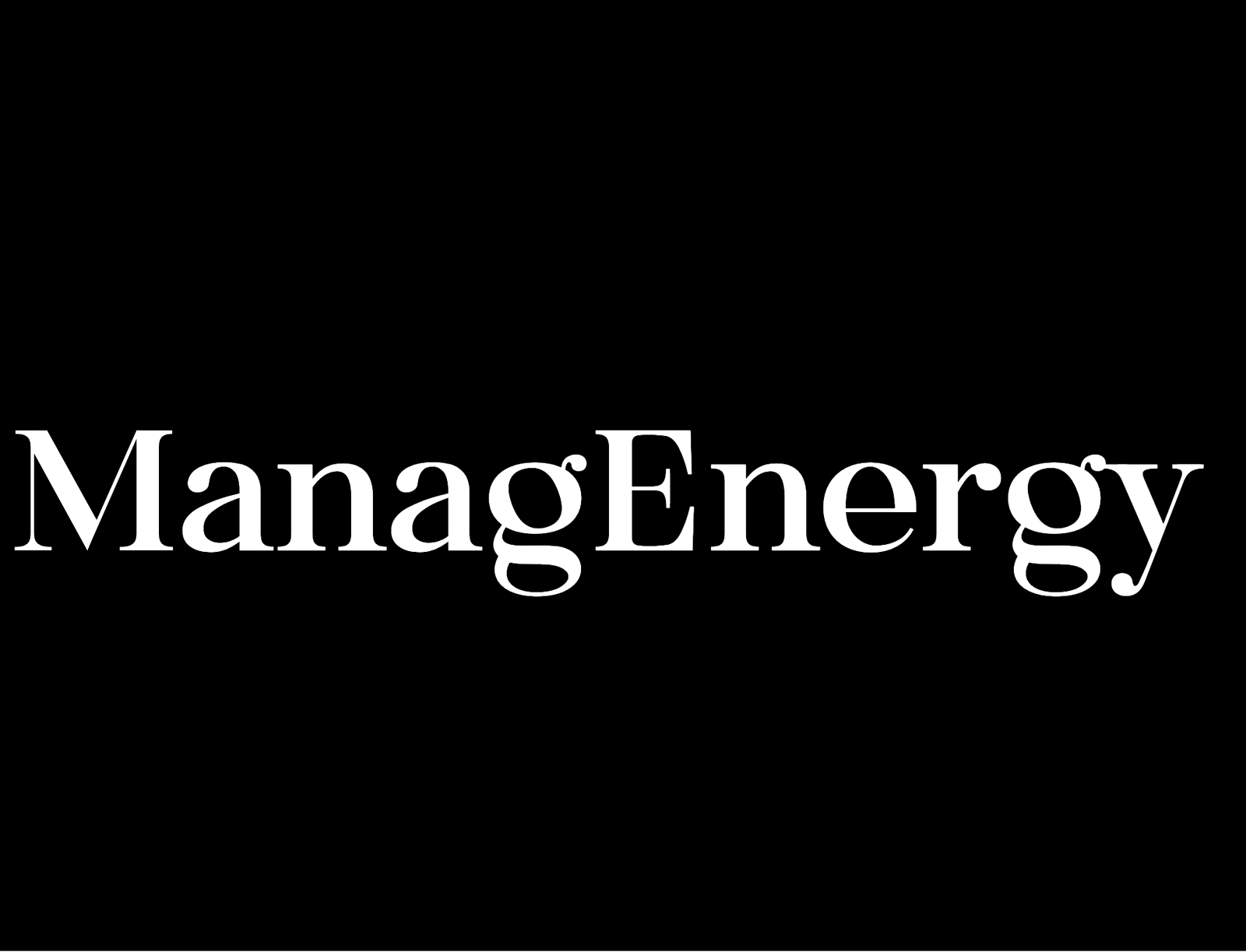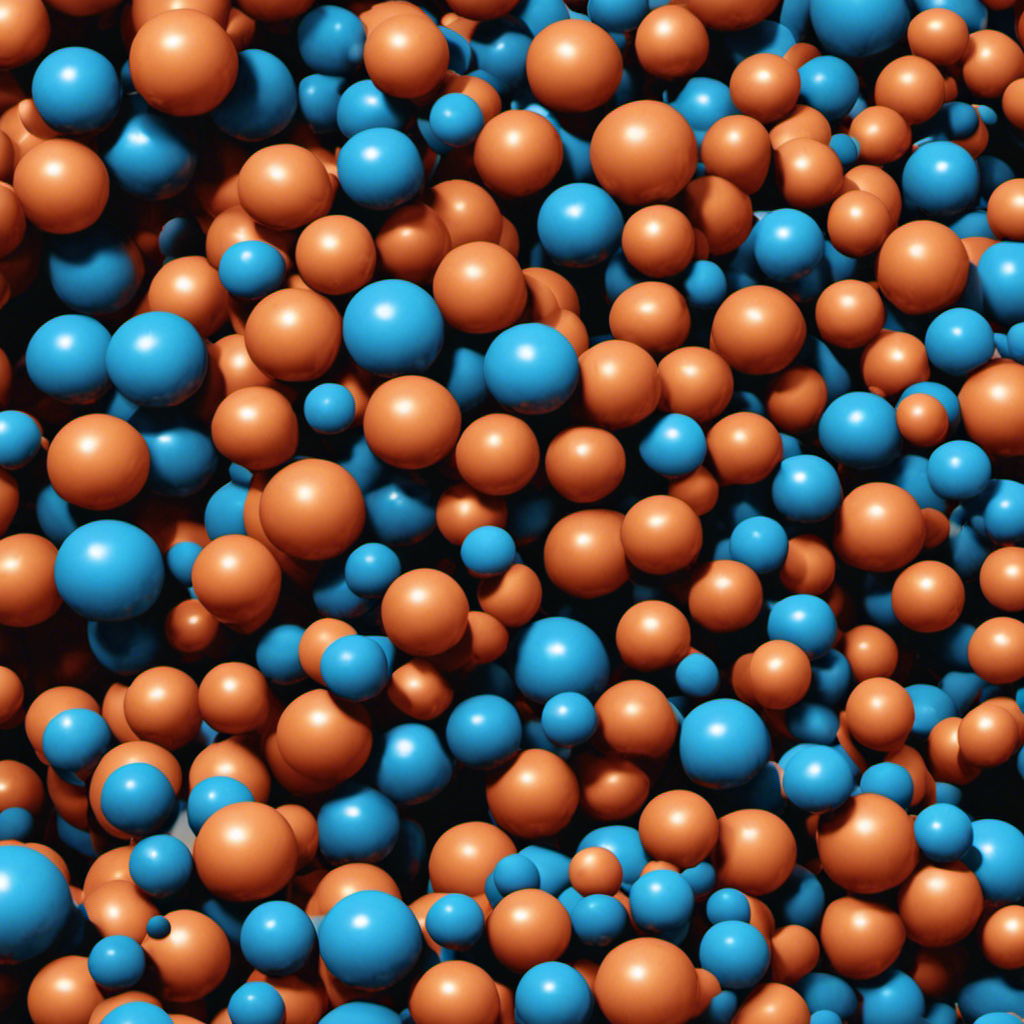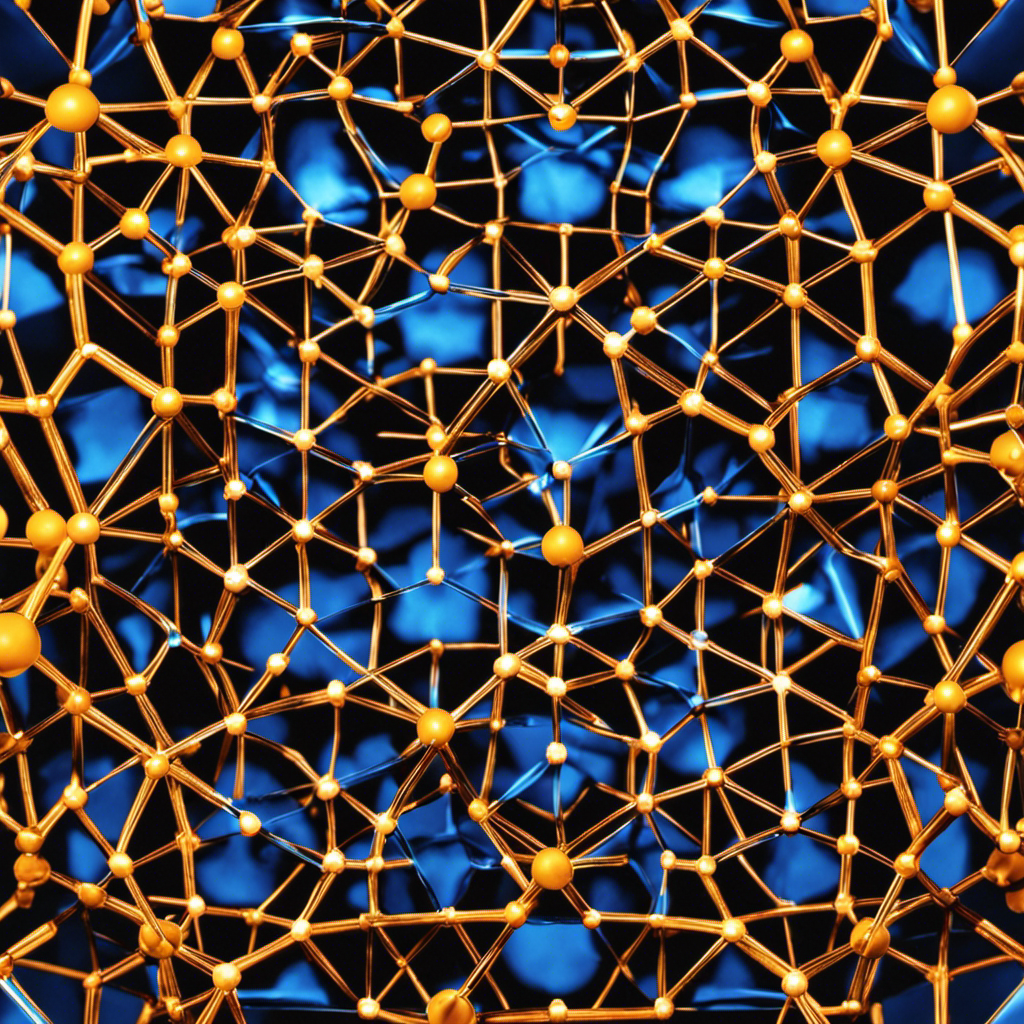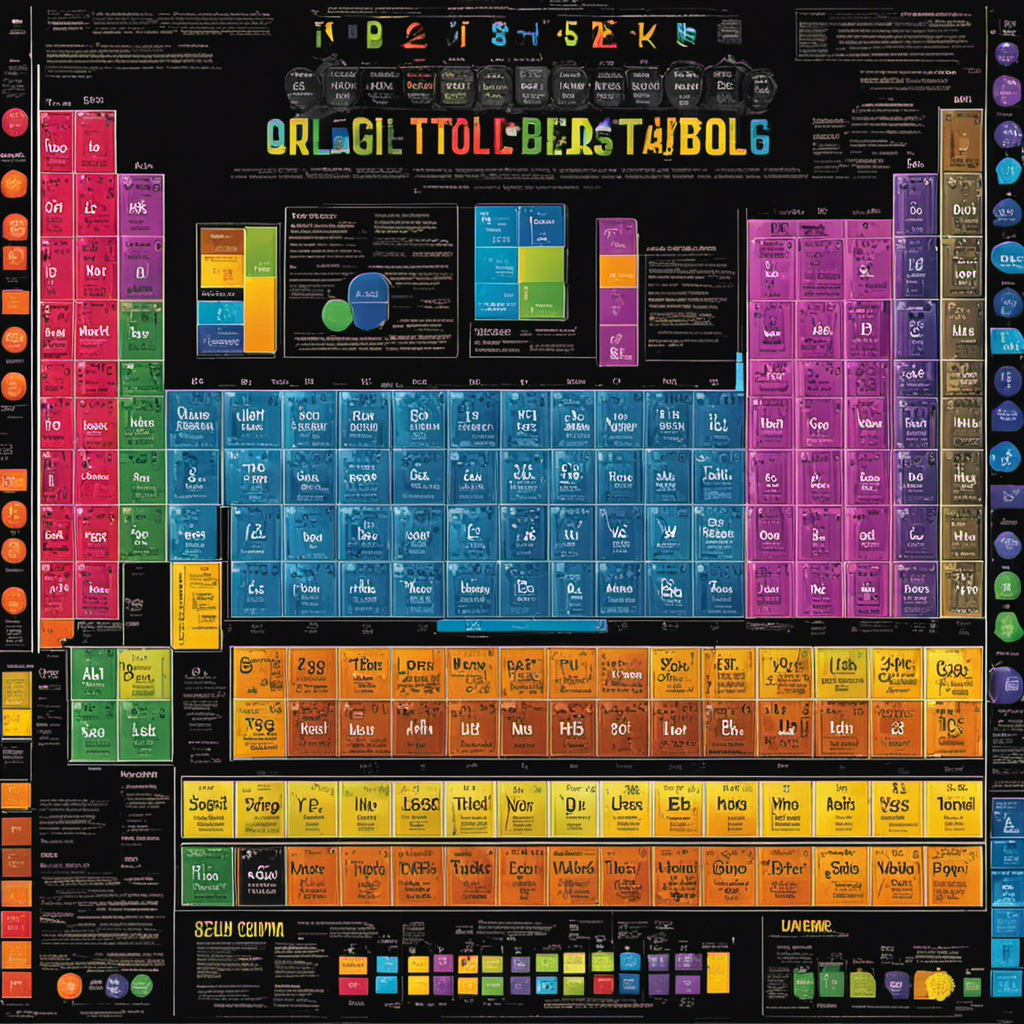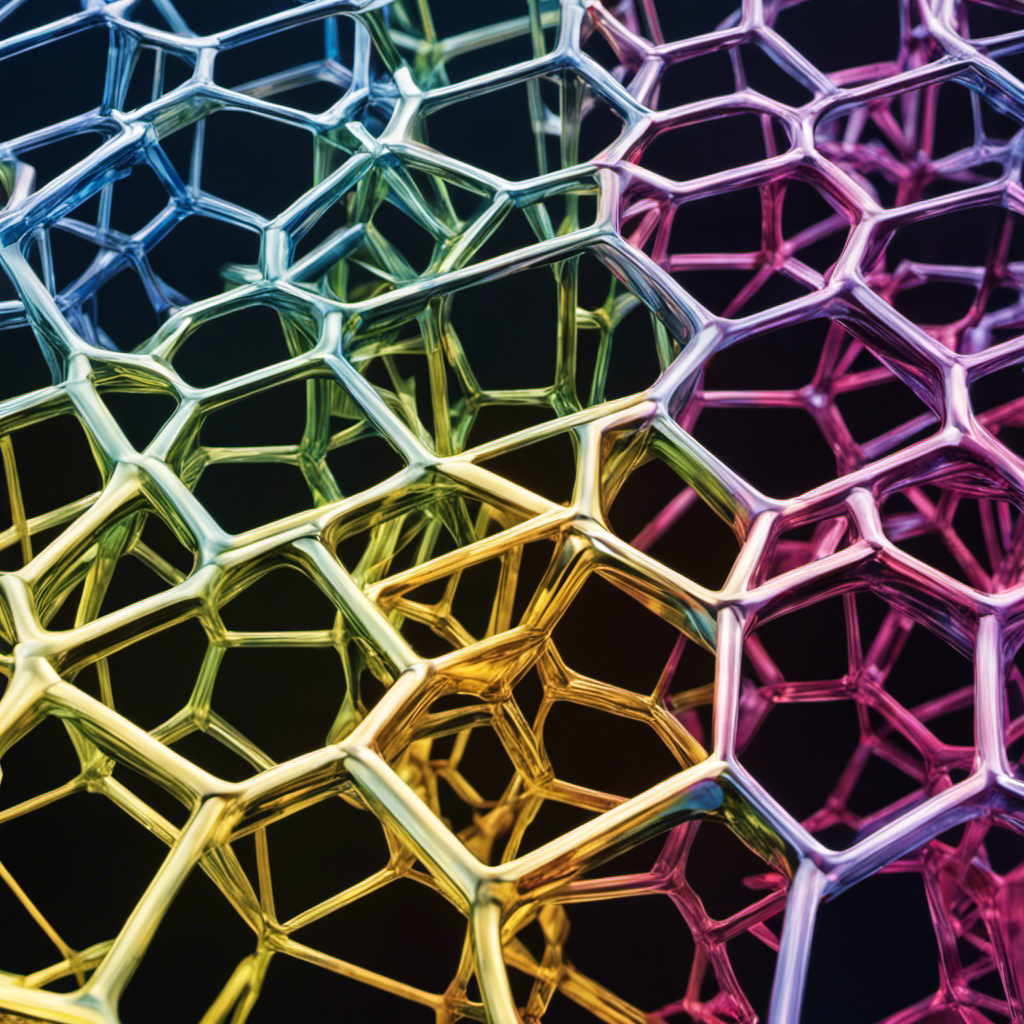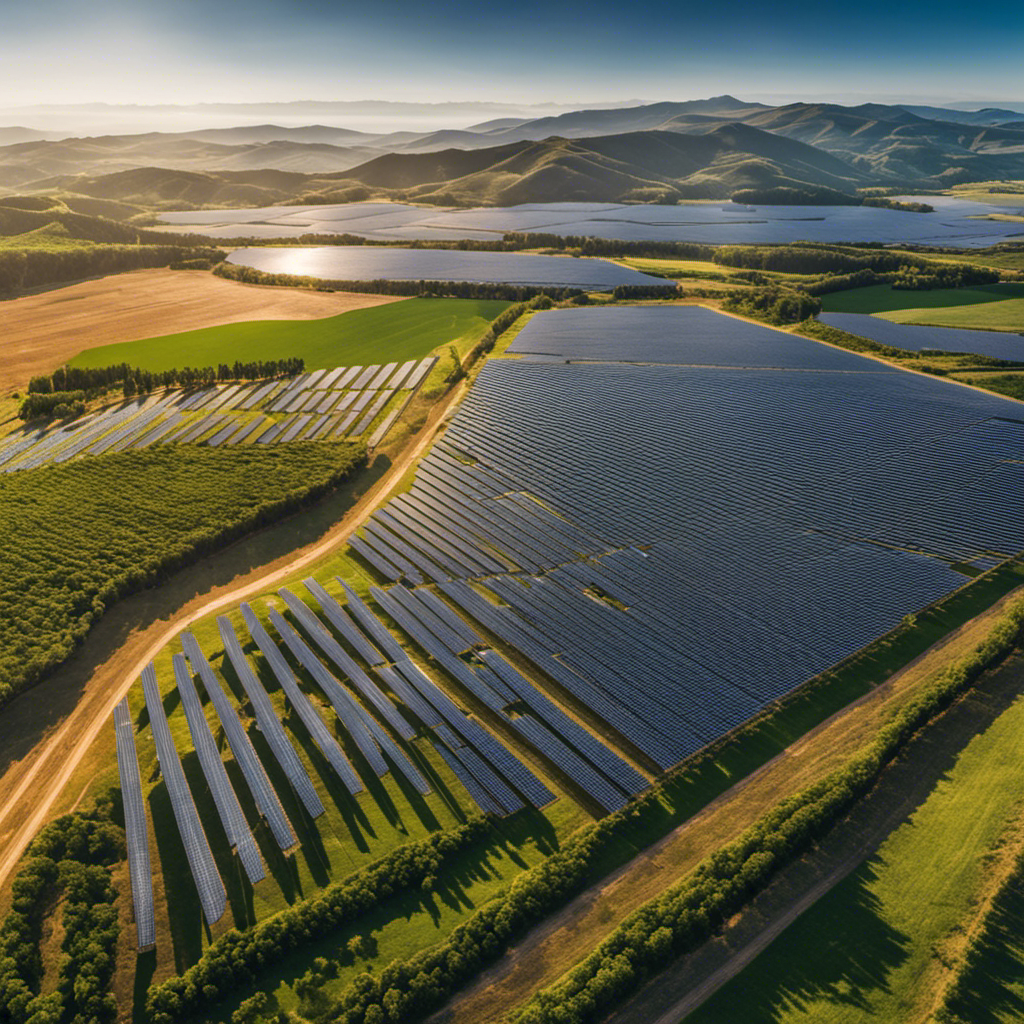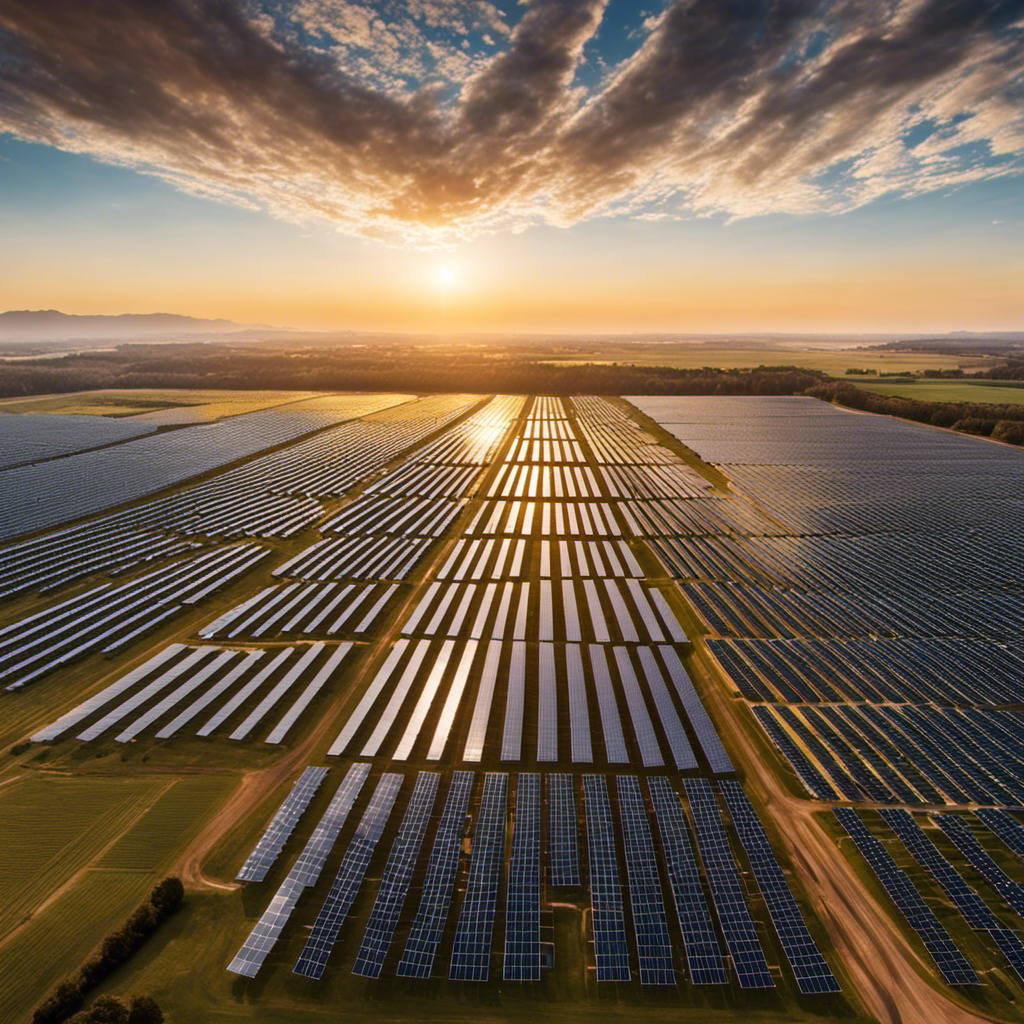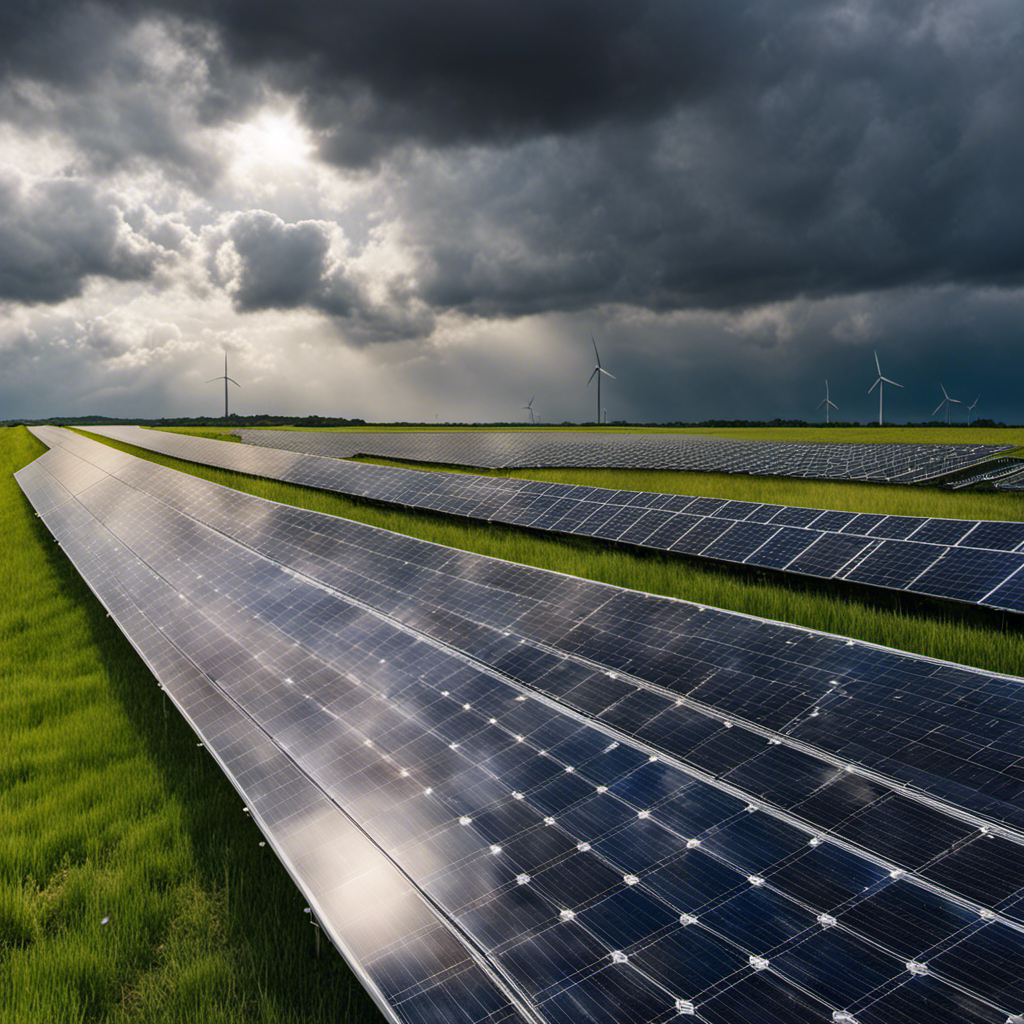Solar
Ultimate Guide to Cleaning Solar Panels Safely
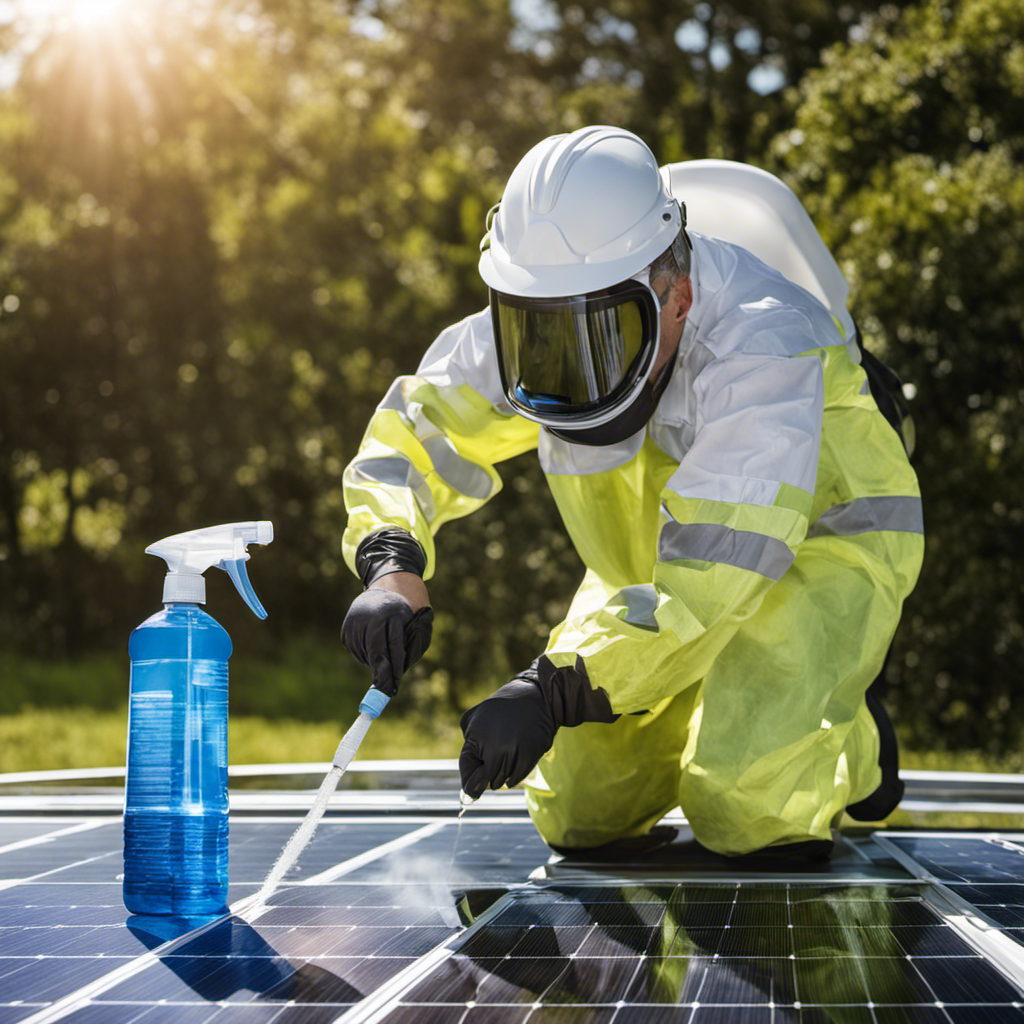
Hello! Were you aware that consistently washing your solar panels can boost their effectiveness by as much as 25%?
In this ultimate guide, I’ll walk you through everything you need to know about safely cleaning your solar panels. We’ll cover important safety precautions, the right gear to use, and the best cleaning techniques for optimal results.
Whether you’re a homeowner or a professional, this guide has got you covered. So let’s dive in and start maximizing your solar panel’s energy production!
Key Takeaways
- Assess the risk and wear appropriate safety gear before accessing the roof for cleaning
- Disconnect the power to the solar panel system before cleaning and contact a professional for complex maintenance needs
- Use a combination of cleaning methods tailored to your specific needs, such as using water and soap solution, power washing, and specialized cleaning equipment
- Thoroughly clean the panels to maintain efficiency and monitor the solar output to measure the cleaning’s impact
Safety Precautions for Cleaning Solar Panels
I always make sure to assess the risk of accessing the roof before cleaning my solar panels. It is crucial to prioritize safety when undertaking this task.
One important aspect is choosing eco-friendly cleaning agents to minimize harm to the environment. These agents should be free from harsh chemicals and toxins that can potentially damage the panels or surrounding areas.
Additionally, preventing water damage during the cleaning process is essential. This can be achieved by using a gentle stream of water, avoiding excessive pressure, and ensuring proper drainage.
Choosing the Right Safety Gear for Solar Panel Cleaning
Before starting the cleaning process, it is crucial to select the appropriate safety gear for the task of solar panel maintenance. Choosing the right safety gear is essential to protect yourself from potential risks and hazards associated with solar panel cleaning. Here is a table outlining the recommended safety gear:
| Safety Gear | Purpose |
|---|---|
| Helmet | Protects the head from falling debris |
| Protective clothing | Shields the body from chemicals and sharp objects |
| Safety goggles | Prevents eye injuries from splashes or flying debris |
| Gloves | Provides hand protection from chemicals and sharp objects |
| Safety shoes | Offers foot protection from falling objects and slippery surfaces |
Disconnecting the Power Before Cleaning Solar Panels
To ensure safety, always disconnect the power to the solar panel system before beginning the cleaning process. Power disconnection is crucial to avoid potential dangers and accidents. Here are some reasons why it is important to disconnect the power:
- Electrical shock: Solar panels generate electricity, and cleaning them while they are still connected to the power source can put you at risk of electrical shock.
- Damage to the system: Accidentally spraying water or using cleaning solutions on live panels can cause damage to the electrical components of the system.
- Fire hazard: Cleaning the panels while they are still powered can increase the risk of short circuits or electrical fires.
To prevent these potential dangers, follow these steps to disconnect the power:
- Consult the user manual or contact a professional for guidance on how to safely disconnect the power supply.
- Locate the main power switch or breaker for the solar panel system.
- Turn off the main power switch or flip the breaker to the off position.
- Verify that the power is disconnected by checking if the solar panels are no longer producing electricity.
When to Contact a Professional for Solar Panel Cleaning
When considering the maintenance of my solar panels, it is important to know when it is necessary to contact a professional for cleaning. While DIY cleaning methods can be effective for regular maintenance, there are certain situations where hiring professionals is the safer and more efficient option. Here is a comparison of DIY cleaning methods versus hiring professionals:
| DIY Cleaning Methods | Hiring Professionals |
|---|---|
| Cleaning with soap and water solution | Use of specialized cleaning equipment |
| Scrubbing with a soft brush or sponge | Deep cleaning and removal of stubborn stains |
| Rinsing with a garden hose | Utilization of pressure washers with correct nozzle settings |
It is recommended to hire professionals when dealing with complex cleaning needs such as severe dirt buildup or hard-to-reach areas. They have the expertise and equipment to ensure a thorough and safe cleaning process, minimizing any potential risks or damages.
Proper Cleaning Techniques for Solar Panels
I find it crucial to utilize a water and soap solution when cleaning my solar panels. This method effectively removes dirt, dust, and grime that can accumulate on the surface of the panels, ensuring optimal performance and energy production.
To grab your attention, let me share with you two important points regarding solar panel cleaning:
-
Cleaning Frequency:
- Regular cleaning is essential to maintain the efficiency of solar panels.
- Aim to clean your panels at least once every three to six months, depending on your location and environmental factors.
-
Eco-Friendly Cleaning Options:
- Consider using eco-friendly cleaning solutions to minimize the environmental impact.
- Use a mixture of water and mild soap or a vinegar-water solution to clean your panels effectively without harming the environment.
Tips for Removing Debris and Dust From Solar Panels
Using a soft brush or sponge, gently scrub the surface of the solar panels to remove debris and dust.
When it comes to removing bird droppings or cleaning water-stained panels, a different approach is needed. Bird droppings can be stubborn and may require more effort to clean.
I recommend using a mild detergent mixed with water to create a cleaning solution. Apply the solution to the affected areas and let it sit for a few minutes to loosen the droppings. Then, use the soft brush or sponge to gently scrub the area.
For water-stained panels, spray a mixture of equal parts vinegar and water onto the surface. Allow the mixture to sit for a few minutes before scrubbing with the brush or sponge.
Remember to rinse the panels thoroughly with water afterward to ensure there is no residue left behind.
Applying a Protective Coating to Extend the Life of Solar Panels
To extend the life of solar panels, I highly recommend applying a protective coating that acts as a barrier against environmental factors. This coating offers several benefits, including enhanced durability. The protective coating creates a shield that safeguards the solar panels from damage caused by dust, dirt, and debris. It helps prevent scratches, corrosion, and fading, ensuring optimal performance and longevity.
Another benefit of applying a protective coating is improved efficiency. By reducing the accumulation of dirt and pollutants on the panel surface, the coating allows more sunlight to reach the solar cells. This results in increased energy production and improved overall efficiency.
Alternative methods of extending the lifespan of solar panels include regular cleaning and maintenance, as well as keeping the surrounding area clear of obstructions. However, applying a protective coating offers an additional layer of protection that can significantly prolong the life of your solar panels.
Regular Maintenance Routines for Optimal Solar Panel Efficiency
Regular maintenance routines are essential for ensuring optimal efficiency of solar panels. Monitoring and measuring solar panel efficiency is crucial in order to identify any decrease in performance and address it promptly. Regular cleaning is of utmost importance for optimal performance of solar panels. Dust, dirt, and debris can accumulate on the surface of the panels, reducing their ability to absorb sunlight and convert it into electricity. By regularly cleaning the panels, you can remove these obstructions and maximize their efficiency. Additionally, regular cleaning allows for the early detection of any potential issues or damages, allowing for timely repairs and preventing further deterioration. By incorporating regular maintenance routines, including cleaning, you can ensure that your solar panels are operating at their highest capacity, resulting in maximum energy generation and cost savings.
| Maintenance Routine | Frequency | Benefits |
|---|---|---|
| Cleaning | Every 3-6 months | Removes dirt and debris, maximizes efficiency |
| Inspection | Annually | Identifies potential issues and damages |
| Repairs and Replacements | As needed | Ensures optimal functionality of panels |
| Monitoring | Regularly, at least monthly | Measures efficiency and detects any decrease |
| Upgrading | As technology advances | Optimizes performance with newer technologies |
Specialized Cleaning Methods for Stubborn Stains or Buildup
I found that a high-pressure washer effectively removes stubborn stains or buildup on my solar panels.
When it comes to cleaning tough stains or buildup on solar panels, there are alternative cleaning methods and cleaning agents that can be used. Here are two options to consider:
-
Non-abrasive cleaning agents:
- Use a mild detergent mixed with warm water to create a cleaning solution.
- Apply the solution to the stained area and gently scrub with a soft brush or sponge.
- Rinse off the solution with clean water and dry the panels with a lint-free cloth.
-
Vinegar solution:
- Mix equal parts of white vinegar and water to create a cleaning solution.
- Apply the solution to the stained area and let it sit for a few minutes.
- Gently scrub the area with a soft brush or sponge.
- Rinse off the solution with clean water and dry the panels with a lint-free cloth.
Remember to always follow the manufacturer’s instructions and exercise caution when using cleaning agents on your solar panels.
Best Time of Day to Clean Solar Panels
Early morning or late afternoon are the optimal times of day to clean solar panels for maximum efficiency. During these times, the sun is at a lower angle, reducing the risk of glare and making it easier to see any dirt or debris on the panels.
Cleaning solar panels in the middle of the day when the sun is at its peak can be challenging due to the intense heat and potential for burns. Additionally, cleaning panels in direct sunlight can cause the water or cleaning solution to evaporate quickly, leaving behind streaks or residue.
It is important to avoid common mistakes when cleaning solar panels, such as using abrasive materials or harsh chemicals that can damage the panel surface. Instead, use a soft brush or sponge with a water and soap solution to gently remove dirt and grime.
Regular cleaning at the right time of day will ensure optimal energy production and prolong the lifespan of your solar panels.
Essential Equipment and Materials for Safe Solar Panel Cleaning
Using a ladder, I can safely access the roof to clean the solar panels. To ensure a successful cleaning process, it is important to have the essential tools and proper cleaning agents.
Here are some important points to consider:
-
Essential Tools:
-
Ladder: Allows safe access to the roof where the solar panels are located.
-
Bucket: Used to hold water and cleaning solution during the cleaning process.
-
Soft brush or sponge: Helps remove surface dust and dirt without scratching the panels.
-
Garden hose: Used to rinse the panels after cleaning and remove any remaining debris.
-
Proper Cleaning Agents:
-
Water and soap solution: A mild and effective cleaning solution for removing dirt and grime from the panels.
-
Detergent designed for solar panel cleaning: Provides a thorough and safe cleaning without damaging the panels.
Frequently Asked Questions
What Are the Potential Risks or Hazards of Cleaning Solar Panels?
The potential risks or hazards of cleaning solar panels include damage to the roof, electrical shock, and falls.
It is important to take safety precautions and wear necessary equipment, such as a helmet, protective clothing, gloves, safety goggles, and a protective suit.
It is also crucial to disconnect the power to the solar panel system before cleaning and clear the area of potential hazards.
Consulting with a professional cleaning company can help mitigate these risks.
How Often Should Solar Panels Be Cleaned for Optimal Efficiency?
For optimal efficiency, solar panels should be cleaned regularly. The frequency of cleaning depends on various factors such as the location, weather conditions, and surrounding environment. It is recommended to clean the panels at least once or twice a year.
However, it is important to note that using the best cleaning products and following DIY cleaning methods can help maintain the panels’ efficiency for longer periods. Regular cleaning ensures that dust, debris, and other pollutants are removed, allowing the panels to generate maximum energy.
Are There Any Specific Cleaning Methods or Techniques to Avoid When Cleaning Solar Panels?
When it comes to cleaning solar panels, there are a few common mistakes to avoid.
One mistake is using abrasive cleaning materials, as they can cause damage to the panel’s surface.
It’s also important to avoid using high-pressure water or power washers, as they can disrupt the delicate components of the panels.
Instead, it’s best to use a gentle cleaning solution and a soft brush or sponge to remove dirt and debris.
Regular cleaning using these techniques will help maintain the efficiency and longevity of your solar panels.
What Are the Signs That Indicate It’s Time to Contact a Professional for Solar Panel Cleaning?
When it comes to solar panel cleaning, there are certain signs that indicate it’s time to contact a professional.
If you notice a significant decrease in your solar panel’s energy production or if there are visible signs of damage, such as cracks or loose connections, it’s best to leave the cleaning to the experts.
Choosing the right professional for solar panel cleaning is crucial. Look for someone who is experienced, licensed, and insured to ensure the job is done safely and effectively.
What Are Some Common Mistakes to Avoid When Cleaning Solar Panels?
When cleaning solar panels, it’s important to avoid common mistakes that can cause damage.
Two common mistakes to avoid are using abrasive materials and harsh chemicals. Abrasive materials can scratch the surface of the panels, reducing their efficiency. Harsh chemicals can also cause damage and may not be safe for the environment.
It’s best to use gentle cleaning methods and non-abrasive materials to ensure the longevity and effectiveness of your solar panels.
Conclusion
In conclusion, maintaining the cleanliness of solar panels is crucial for optimal energy production. By following the safety precautions outlined in the ultimate guide to cleaning solar panels safely, individuals can ensure their well-being while effectively cleaning their panels.
Remember, ‘an ounce of prevention is worth a pound of cure.’ By regularly cleaning and maintaining solar panels using the proper techniques and equipment, you can maximize their efficiency and prolong their lifespan.
Stay safe, stay informed, and enjoy the benefits of clean and efficient solar energy.
Solar
Plants, Water, Solar Energy Are All Examples Of What Kind Of Resources

I have often pondered the unique qualities that make plants, water, and solar energy stand out. Surprisingly, these resources are not just arbitrary elements in nature. They are classified as renewable resources.
In other words, they have the remarkable ability to replenish themselves and be used indefinitely. This article will delve into the various types of resources, such as natural, sustainable, eco-friendly, and green resources, shedding light on their importance and impact on our environment.
Key Takeaways
- Plants, water, and solar energy are examples of renewable resources.
- Renewable resources can be relied upon for a sustainable future.
- Advantages of renewable resources include their abundance and natural replenishment.
- They produce minimal to no greenhouse gas emissions, reducing environmental impact.
Renewable Resources
Renewable resources, like plants, water, and solar energy, are the types of resources that you can rely on for a sustainable future. The advantages of using renewable resources in daily life are numerous.
Firstly, they are abundant and can be replenished naturally, ensuring their availability for generations to come.
Secondly, they produce minimal to no greenhouse gas emissions, reducing the negative impact on the environment and combating climate change.
Additionally, renewable resources can lead to energy independence and reduce reliance on fossil fuels. However, there are also challenges associated with their use.
One challenge is the intermittency of certain renewable resources, such as solar and wind, which require energy storage and grid management solutions.
Despite these challenges, the latest innovations in renewable resource technology, such as improved efficiency and cost-effectiveness, are making them increasingly viable and attractive options for sustainable living.
Natural Resources
You can find a wide variety of natural resources such as plants, water, solar energy, and more. These resources are essential for our survival and play a crucial role in sustaining the environment. Conservation methods are necessary to ensure the long-term availability of these resources and minimize their impact on the environment. By implementing sustainable practices, we can protect natural resources for future generations.
Here is a table showcasing the impact of different conservation methods on the environment:
| Conservation Method | Impact on the Environment |
|---|---|
| Renewable Energy | Reduces greenhouse gas emissions and dependence on fossil fuels |
| Water Conservation | Preserves water sources and reduces water scarcity |
| Forest Conservation | Protects biodiversity, prevents deforestation, and mitigates climate change |
| Sustainable Agriculture | Reduces soil erosion, improves soil quality, and minimizes chemical runoff |
| Waste Management | Reduces pollution, conserves resources, and minimizes landfill space |
Sustainable Resources
Here’s a variety of sustainable resources that are crucial for our survival and play a significant role in sustaining the environment. Sustainable farming practices contribute to the production of these resources.
By utilizing techniques such as organic farming, crop rotation, and integrated pest management, farmers can reduce the negative impacts on the ecosystem and maintain the fertility of the soil. These practices promote biodiversity, conserve water, and minimize the use of harmful chemicals.
Industries can also benefit from using sustainable resources. By incorporating renewable energy sources like solar and wind power, businesses can reduce their carbon footprint and decrease reliance on fossil fuels. This not only helps to mitigate climate change but also promotes economic growth and job creation in the renewable energy sector.
Transitioning to eco-friendly resources is a logical step forward in our quest for a sustainable future.
Eco-friendly Resources
When looking for environmentally friendly alternatives, I always consider using products that are made from recycled materials. It’s important to choose eco-friendly resources that promote sustainability and contribute to recycling initiatives.
Sustainable farming is one such initiative that focuses on minimizing the negative impact of agriculture on the environment. By utilizing organic farming practices and reducing the use of synthetic fertilizers and pesticides, sustainable farming aims to protect soil health, conserve water, and promote biodiversity.
Additionally, recycling initiatives play a crucial role in reducing waste and conserving natural resources. By recycling materials such as paper, plastic, and glass, we can reduce the need for raw materials and energy consumption, ultimately minimizing our ecological footprint.
Choosing products made from recycled materials and supporting sustainable farming practices are excellent ways to contribute to a greener and more sustainable future.
Green Resources
Using renewable materials like bamboo and cork can be a great way to incorporate green resources into your home decor. These materials have several benefits, including water conservation and positive impacts on urban areas.
Bamboo is a rapidly renewable resource that requires less water than traditional wood, making it a sustainable choice for furniture and flooring.
Cork is harvested from the bark of cork oak trees, which can be done without harming the tree. This helps to conserve water and reduce deforestation.
Green resources like bamboo and cork can improve air quality by absorbing carbon dioxide and releasing oxygen.
Incorporating these materials into urban areas can help reduce the heat island effect by providing shade and cooling surfaces.
Using renewable materials also supports sustainable industries, creating jobs and economic opportunities in urban areas.
Frequently Asked Questions
How Do Renewable Resources Differ From Natural Resources?
Renewable resources and natural resources differ in terms of their availability and impact on the environment.
While natural resources are found in the Earth’s natural environment, renewable resources can be replenished or regenerated over time.
This makes renewable resources more sustainable and environmentally friendly compared to non-renewable resources.
The use of renewable resources reduces our dependence on fossil fuels and decreases harmful emissions, contributing to a healthier planet.
What Are Some Examples of Sustainable Resources Other Than Plants, Water, and Solar Energy?
When considering sustainable resources, it’s important to look beyond just plants, water, and solar energy.
Examples of other sustainable resources include wind power and geothermal energy. These resources harness the power of the natural elements to generate clean and renewable energy.
Wind power utilizes the force of the wind to turn turbines and generate electricity, while geothermal energy taps into the heat from within the Earth to produce power.
These resources offer viable alternatives to traditional fossil fuels and contribute to a more sustainable future.
Can You Provide Some Examples of Eco-Friendly Resources That Are Not Considered Sustainable?
Eco-friendly resources play a crucial role in mitigating environmental impacts. However, it’s important to note that not all eco-friendly resources are sustainable.
Some examples of non-sustainable eco-friendly resources include certain types of biofuels that rely on unsustainable farming practices or deforestation. Additionally, certain building materials like bamboo can be eco-friendly, but if sourced irresponsibly, they can contribute to deforestation.
It is important to carefully consider the sustainability of eco-friendly resources to ensure long-term environmental benefits.
Are Green Resources Always Renewable in Nature?
Green resources are not always renewable in nature. While many green resources, such as plants, water, and solar energy, are indeed renewable, there are some that are not.
For example, certain types of biomass energy, like burning wood from unsustainable sources, can deplete forests and contribute to deforestation. Additionally, some forms of hydropower can have negative environmental impacts, such as disrupting river ecosystems.
It is important to carefully consider the pros and cons of renewable resources to ensure their sustainability.
How Do Natural Resources Contribute to the Concept of Sustainability?
The role of natural resources in achieving sustainability is crucial. Sustainable resource management has a significant impact on the environment. By properly managing resources like plants, water, and solar energy, we can ensure their availability for future generations.
This involves reducing waste, conserving energy, and implementing renewable energy sources. By doing so, we can minimize our ecological footprint and contribute to a more sustainable future.
It is essential to prioritize sustainable resource management to protect our environment and promote long-term sustainability.
Conclusion
In conclusion, plants, water, and solar energy are all examples of renewable resources. These resources can be replenished naturally and sustainably, making them eco-friendly and green alternatives.
By harnessing the power of nature, we can ensure a more sustainable future for generations to come. It’s fascinating to see how these resources coincide perfectly with our needs, providing us with the necessary energy and sustenance.
With the evidence-based knowledge of their benefits, we can confidently embrace these resources and work towards a greener and more sustainable world.
Solar
In General, Do You Think Flagstaff Is A Good Location For Harnessing Solar Energy? Why Or Why Not

I think Flagstaff is an excellent location for utilizing solar power. The city’s elevated position and favorable weather conditions result in abundant sunlight all year round, making it a perfect spot for installing solar panels.
Additionally, the local government offers support and incentives for renewable energy initiatives, further enhancing the viability of solar power in Flagstaff.
In this article, we will explore the various factors that contribute to Flagstaff’s potential as a solar energy hub, using data-driven analysis to present a persuasive case.
Key Takeaways
- Flagstaff experiences approximately 266 sunny days each year, making it suitable for harnessing solar energy.
- The high altitude of Flagstaff at around 7,000 feet increases sunlight absorption and solar panel efficiency.
- Cloud cover and weather patterns can impact solar energy effectiveness, but strategies like solar tracking systems and tilt adjustments can optimize solar energy generation.
- Flagstaff has implemented various programs to incentivize the development and adoption of solar energy, resulting in a significant increase in solar capacity in the city.
Climate and Sunlight Availability
You’ll find that Flagstaff’s climate and ample sunlight make it an ideal location for harnessing solar energy.
The city experiences approximately 266 sunny days each year, providing a significant amount of sunlight for solar panels. The high altitude and clear skies contribute to a favorable solar panel efficiency, allowing for maximum energy production.
Additionally, Flagstaff’s climate is characterized by cool temperatures and low humidity, which can help enhance the performance of solar panels.
Furthermore, advancements in solar energy storage technologies have made it possible to store excess energy generated during the day for use during the night or on cloudy days. This ensures a reliable and consistent supply of solar energy, even when sunlight is not readily available.
Overall, Flagstaff’s climate and sunlight availability, coupled with efficient solar panel technology and energy storage capabilities, make it a highly suitable location for harnessing solar energy.
Geographic Location
When considering the impact of elevation on sunlight, weather patterns, and clouds, it’s important to analyze the data and understand the potential implications.
Higher elevations tend to receive more direct sunlight due to reduced atmospheric interference, which can be advantageous for solar energy production.
Additionally, the influence of elevation on weather patterns and cloud cover can affect the overall solar resource of a location. This makes it crucial to assess these factors when determining the suitability of a particular area for harnessing solar energy.
Elevation’s Impact on Sunlight
The higher the elevation, the more sunlight Flagstaff receives, making it an ideal location for harnessing solar energy. With its elevation of 6,910 feet, Flagstaff benefits from increased sunlight absorption, resulting in higher solar panel efficiency. This is due to the fact that at higher elevations, there is less atmosphere for sunlight to pass through before reaching the surface.
As a result, more sunlight reaches the solar panels, increasing their efficiency in converting sunlight into electricity. According to data from the National Renewable Energy Laboratory, Flagstaff receives an average of 266 sunny days per year, providing ample opportunity for solar energy production.
However, while elevation plays a significant role in sunlight exposure, it is important to also consider other factors such as weather patterns and clouds, which can impact solar energy generation.
Weather Patterns and Clouds
Cloud cover and weather patterns greatly affect the amount of sunlight that reaches solar panels, impacting their efficiency in converting sunlight into electricity. In Flagstaff, where weather patterns and cloud cover can be quite variable, this can have a significant impact on the overall effectiveness of solar energy systems.
Data shows that the region experiences an average of 266 days of sunshine per year, which is quite promising for solar energy generation. However, the presence of clouds can reduce the amount of sunlight reaching solar panels, potentially decreasing their efficiency. It is important to consider the potential impact of weather patterns and cloud cover when determining the suitability of Flagstaff as a location for harnessing solar energy.
Transition: While weather patterns and cloud cover play a crucial role in solar energy efficiency, another factor to consider is the altitude and elevation of the location.
Altitude and Elevation
Altitude and elevation can greatly impact the efficiency of harnessing solar energy in Flagstaff. The higher the altitude, the more intense the sunlight, which can lead to increased solar panel efficiency. According to studies, every 1,000 feet increase in altitude can result in a 4-6% increase in solar panel output.
Flagstaff, located at an elevation of around 7,000 feet, benefits from this natural advantage. The higher elevation means that there is less atmosphere to absorb and scatter sunlight, allowing for more direct sunlight reaching the solar panels. This increased efficiency makes Flagstaff an ideal location for harnessing solar energy.
With its high altitude and abundant sunlight, the potential for solar panel installations in Flagstaff is promising.
Potential for Solar Panel Installations
When considering the potential for solar panel installations in Flagstaff, it is important to assess both the solar panel efficiency and the cost of installation. Solar panel efficiency refers to the ability of the panels to convert sunlight into usable electricity. Higher efficiency panels can generate more electricity for a given amount of sunlight. Additionally, the cost of installation is a crucial factor in determining the feasibility of solar energy projects. The table below highlights the average solar panel efficiency and the average cost of installation in Flagstaff compared to the national average:
| Solar Panel Efficiency | Cost of Installation | |
|---|---|---|
| Flagstaff | 18-20% | $3.50/W |
| National Average | 15-18% | $2.50/W |
As shown in the table, Flagstaff has a higher solar panel efficiency compared to the national average. However, the cost of installation in Flagstaff is slightly higher. Despite the higher installation cost, the greater efficiency of solar panels in Flagstaff could make it a favorable location for harnessing solar energy.
Moving forward, it is important to consider the impact of cloud cover on solar energy generation in Flagstaff.
Impact of Cloud Cover on Solar Energy Generation
To maximize solar energy generation in Flagstaff, it’s crucial to understand the impact of cloud cover on efficiency. Cloud cover can significantly affect the amount of sunlight reaching solar panels, thus reducing their energy output.
According to data from the National Renewable Energy Laboratory, Flagstaff experiences an average of 213 cloudy days per year, which is higher than the national average. This high frequency of cloud cover poses a challenge for solar energy generation in the area.
However, it is important to note that even with the presence of clouds, solar panels can still generate electricity, although at a reduced efficiency. By considering this impact of cloud cover and implementing strategies such as using solar tracking systems and tilt adjustments, it is possible to optimize solar energy generation in Flagstaff despite the challenges posed by cloud cover.
Seasonal Variations in Solar Energy Production
During certain seasons, cloud cover tends to increase, resulting in lower solar energy production levels. This variation in solar energy production can have significant implications for its efficiency and effectiveness as a renewable energy source. Here are four key points to consider:
-
Decreased solar energy production during cloudy seasons can lead to a reduction in overall energy output and potential financial losses for solar energy systems owners.
-
The lower solar energy production levels can also impact the reliability and stability of the power grid, potentially causing disruptions in electricity supply.
-
Seasonal variations in solar energy production can have implications for the integration of solar power into the existing energy infrastructure, requiring additional investments in storage and backup systems.
-
Cloud cover can also affect the environment, as solar energy plays a role in mitigating greenhouse gas emissions and reducing dependence on fossil fuels, leading to a positive impact on wildlife and ecosystems.
Considering these factors, it becomes crucial for local governments to provide support and incentives for solar energy development to overcome the challenges posed by seasonal variations and maximize the benefits of renewable energy sources.
Local Government Support and Incentives
Local governments can provide support and incentives to encourage the development and adoption of solar energy. In the case of Flagstaff, local government initiatives have played a crucial role in promoting the use of solar power.
The city has implemented various programs aimed at incentivizing residents and businesses to invest in solar energy systems. One such initiative is the Solar Flagstaff program, which offers financial incentives and rebates to individuals who install solar panels on their properties.
Additionally, the city has streamlined the permitting process for solar installations, making it easier and more cost-effective for residents to go solar. These efforts have resulted in a significant increase in solar capacity in Flagstaff, contributing to the city’s overall renewable energy goals.
Availability of Solar Energy Resources
The availability of solar energy resources in Flagstaff has been a key factor in the city’s successful adoption of renewable energy. Flagstaff is blessed with abundant sunshine, making it an ideal location for harnessing solar energy. Here are four reasons why Flagstaff has great solar energy potential and efficiency:
-
Abundant Sunshine: Flagstaff enjoys an average of 266 sunny days per year, providing ample opportunity to capture solar energy.
-
High Altitude: Flagstaff’s higher elevation results in less atmospheric interference, allowing for better solar energy absorption and efficiency.
-
Clear Skies: The region experiences minimal cloud cover, ensuring consistent solar energy production throughout the year.
-
Long Days: Flagstaff’s location at higher latitudes means longer daylight hours during the summer months, maximizing solar energy generation.
With these favorable conditions, Flagstaff has the opportunity to become a leader in solar energy production, reducing carbon emissions and promoting sustainability.
Economic Viability of Solar Power in Flagstaff
If you want to save money on your electricity bills in Flagstaff, solar power is a viable option for you. The cost of solar power has decreased significantly over the years, making it more affordable for homeowners. According to data, the average cost of installing a solar panel system in Flagstaff is around $3.30 per watt, which is lower than the national average.
Additionally, solar energy efficiency in Flagstaff is quite high due to its location. Flagstaff receives an average of 266 sunny days per year, making it an ideal place for harnessing solar energy.
With the combination of lower installation costs and high energy efficiency, investing in solar power in Flagstaff can provide significant long-term savings on electricity bills.
Frequently Asked Questions
What Is the Average Cost of Installing Solar Panels in Flagstaff?
The average cost of installing solar panels in Flagstaff can vary depending on several factors, such as the size of the system and the type of panels chosen. However, there are financing options available that can help make the upfront cost more affordable.
With the abundance of sunlight in Flagstaff, harnessing solar energy can be a cost-effective and sustainable solution for homeowners and businesses. It is a smart investment that can provide long-term savings and reduce carbon emissions.
Are There Any Local Government Incentives or Rebates Available for Installing Solar Energy Systems in Flagstaff?
Yes, there are local government incentives and rebates available for installing solar energy systems in Flagstaff.
For example, the City of Flagstaff offers a solar rebate program that provides financial incentives to residents who install solar panels on their homes.
Additionally, the state of Arizona offers a tax credit for solar energy systems.
These incentives and rebates make Flagstaff a desirable location for harnessing solar energy, as they help to offset the initial cost of installation and make solar energy more accessible to residents.
How Much of Flagstaff’s Energy Needs Can Be Met by Harnessing Solar Power?
Harnessing solar power has the potential to meet a significant portion of Flagstaff’s energy needs. However, there are potential challenges to consider, such as the city’s high latitude and the presence of cloudy weather.
Despite these challenges, technological advancements in solar energy systems are constantly being made, which could increase the efficiency and reliability of solar power in Flagstaff.
It is important to continue exploring and investing in renewable energy sources to ensure a sustainable future for the city.
What Is the Projected Growth of the Solar Energy Industry in Flagstaff?
Projected growth in the solar energy industry in Flagstaff is promising, offering exciting job opportunities. The industry is expected to expand rapidly, creating a surge in employment and economic growth.
As more businesses and homeowners embrace solar power, the demand for solar installations and maintenance will increase. This growth will not only provide job opportunities but also contribute to the overall sustainability and clean energy goals of the city.
Flagstaff’s potential as a hub for solar energy is bright.
Are There Any Specific Regulations or Restrictions on Installing Solar Panels in Flagstaff?
There are specific regulations and installation restrictions on installing solar panels in Flagstaff. These regulations vary depending on factors such as zoning and building codes.
For example, there may be restrictions on the size and placement of solar panels to ensure they don’t obstruct views or violate property setbacks.
Additionally, permits and inspections may be required to ensure the safety and compliance of solar panel installations.
These regulations aim to balance the promotion of solar energy with the preservation of the city’s aesthetic and safety standards.
Conclusion
In conclusion, when considering whether Flagstaff is a good location for harnessing solar energy, there are several factors to take into account.
The city’s climate and sunlight availability, along with its geographic location and altitude, provide a favorable environment for solar panel installations. However, the impact of cloud cover and seasonal variations must be considered.
Additionally, local government support and incentives, as well as the availability and economic viability of solar resources, play a crucial role.
Overall, the data suggests that Flagstaff holds great potential for harnessing solar energy, but further analysis and evaluation are necessary to determine its full capacity.
Solar
How Will Solar Energy Investment Be Treated Under The New Tax Law
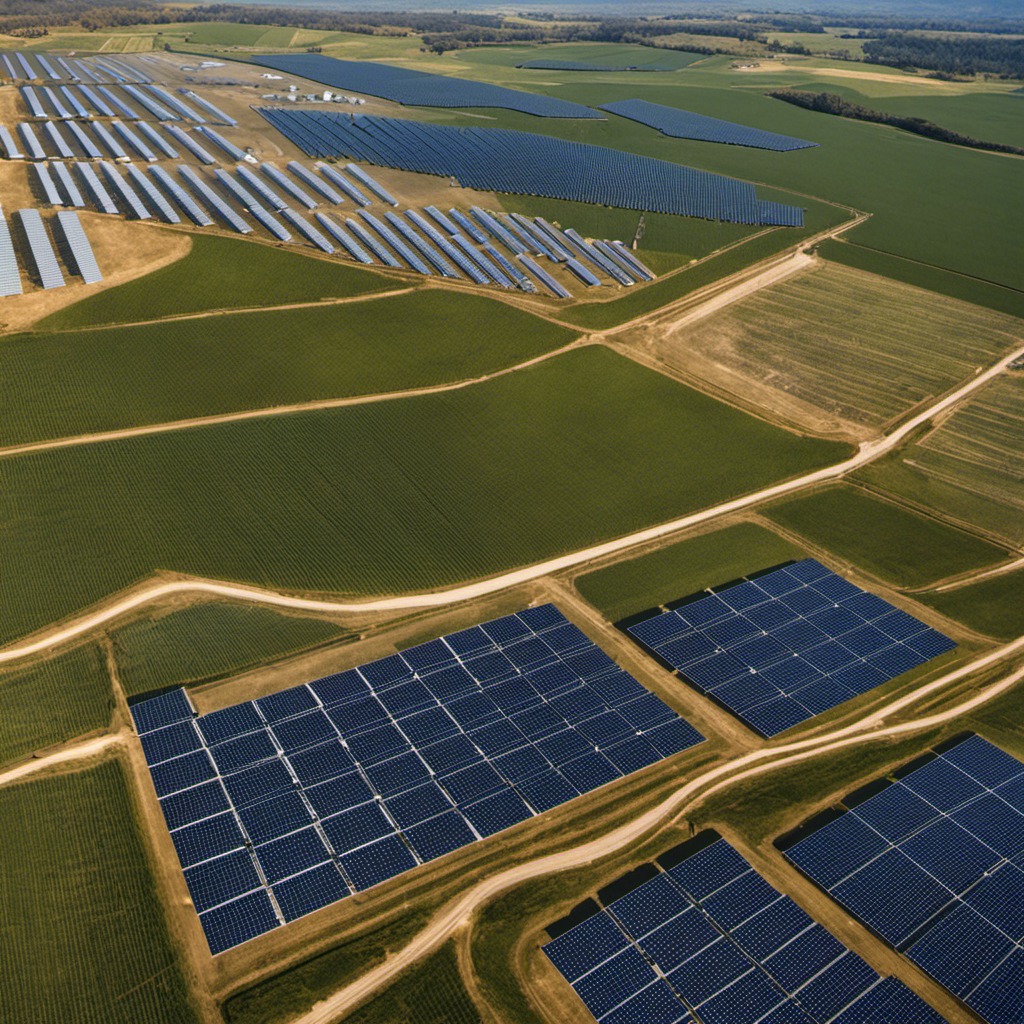
As an investor in solar energy, I am eager to see the effects of the new tax law on my investments. With the Investment Tax Credit (ITC) and updates to depreciation regulations, it is essential to grasp the qualifications for federal tax benefits as well as state-level incentives and rebates.
Additionally, the tax treatment of solar energy storage systems and the implications for solar leasing and power purchase agreements (PPAs) need careful consideration.
In this article, I will delve into these details and analyze how the new tax law may affect the growth of the solar industry.
Key Takeaways
- The new tax law maintains the Investment Tax Credit (ITC) for solar energy investments, which provides a credit of up to 30% of the cost of installing a solar energy system.
- Taxpayers can claim a credit for a percentage of their qualified solar energy property expenditures, reducing their overall tax liability.
- State-level tax incentives and rebates are available to promote the adoption of renewable energy, including solar energy storage, and can provide financial benefits such as tax credits, exemptions, and grants.
- The impact of the new tax law on job creation in the solar industry and the growth of renewable energy is uncertain, as changes to tax rates and incentives could potentially affect market growth and the profitability of solar projects.
Impact on Investment Tax Credit (ITC
You’ll be happy to know that the new tax law maintains the Investment Tax Credit (ITC) for solar energy investments. Under the new law, eligible taxpayers can still claim a credit for a percentage of their qualified solar energy property expenditures.
The ITC remains an important incentive for promoting solar energy investment and reducing reliance on traditional energy sources. To be eligible for the ITC, taxpayers must meet certain requirements, including owning the solar energy property and placing it in service before a specified date.
The tax implications of the ITC are significant, as it can provide a direct reduction in tax liability. The credit amount varies depending on the year the property is placed in service, with higher credit rates available for projects completed before certain deadlines.
Overall, the maintenance of the ITC encourages continued investment in solar energy and supports the growth of this renewable energy sector.
Changes in Depreciation Rules
The new tax law brings about changes in how depreciation rules are applied to solar energy investments. These changes have a significant impact on the tax credits and the overall cost of solar installations.
Under the previous tax law, solar energy investments were eligible for the Investment Tax Credit (ITC), which allowed investors to claim a percentage of the investment cost as a tax credit. However, with the changes in depreciation rules, the ITC can no longer be claimed on the full investment cost. Instead, the tax credit is now based on the depreciated value of the solar installation.
This means that the tax benefits for solar investments will be spread out over a longer period, resulting in a reduced impact on solar installations. It is important for investors and industry stakeholders to understand these changes in order to accurately assess the financial viability of solar energy projects under the new tax law.
Eligibility for Federal Tax Incentives
Eligible taxpayers can now claim federal tax incentives for their renewable projects. Under the new tax law, there are several key points to consider regarding federal tax credits and investment eligibility:
-
Investment Tax Credit (ITC): The ITC allows taxpayers to claim a credit of up to 30% of the cost of installing a solar energy system. This credit is available for both residential and commercial properties.
-
Production Tax Credit (PTC): The PTC provides a per-kilowatt-hour credit for electricity generated from renewable energy sources, including solar. However, it is important to note that the PTC is set to phase out for new projects.
-
Safe Harbor Provision: The safe harbor provision allows taxpayers to lock in the full federal tax credit by starting construction or incurring significant costs before the credit begins to phase out.
These federal tax incentives provide significant opportunities for taxpayers to invest in renewable energy projects and reduce their tax liability. However, it is also important to explore state-level tax incentives and rebates to maximize the financial benefits of such investments.
State-Level Tax Incentives and Rebates
To maximize your financial benefits, it’s worth exploring state-level tax incentives and rebates for your renewable energy projects.
Many states offer tax incentives and rebates to promote the adoption of renewable energy, including solar energy storage. These incentives can help offset the costs of installing and maintaining solar energy storage systems.
Some states provide tax credits or exemptions for purchasing and installing solar energy storage systems. Others offer rebates or grants that can help reduce the upfront costs of these systems.
It’s important to research and understand the specific incentives and rebates available in your state, as they can vary widely. Consult with a tax professional or renewable energy expert to determine the best options for maximizing your financial benefits through state-level tax incentives and rebates.
Implications for Solar Leasing and Power Purchase Agreements (PPAs
You should consider the implications for solar leasing and Power Purchase Agreements (PPAs) when exploring state-level tax incentives and rebates for your renewable energy projects. These implications can significantly impact the financial feasibility and profitability of your solar energy investment.
Here are some key points to consider:
-
Tax incentives: State-level tax incentives can provide significant financial benefits for solar leasing and PPAs. These incentives can include tax credits, exemptions, and deductions that reduce the overall tax burden and increase cash flow for the project.
-
Rebate programs: Some states offer rebate programs that provide direct monetary incentives for solar leasing and PPAs. These programs can help offset the upfront costs of installing solar panels and make the investment more attractive.
-
Renewable portfolio standards: Many states have established renewable portfolio standards (RPS) that require a certain percentage of energy to come from renewable sources. Solar leasing and PPAs can help utilities meet these requirements and create additional revenue streams for project developers.
Considering these implications is crucial when evaluating the financial viability of solar leasing and PPAs under state-level tax incentives and rebates. It’s important to thoroughly research and understand these programs to maximize the benefits and optimize the return on investment for your renewable energy project.
Tax Treatment of Solar Energy Storage Systems
Tax incentives for storage play a crucial role in shaping the future of the solar industry. With the introduction of these incentives, the impact on the solar industry is expected to be significant. This is because it encourages the integration of storage systems into solar energy installations.
Not only does this provide financial benefits for consumers, but it also enhances the overall reliability and efficiency of solar energy systems.
Tax Incentives for Storage
Don’t miss out on the potential tax incentives for solar energy storage. The new tax law offers attractive benefits for those investing in this technology. Here are three key points to consider:
-
Tax credits: The federal government provides a Investment Tax Credit (ITC) for solar energy storage systems. This credit allows you to deduct a percentage of the system’s cost from your federal tax liability. It’s a great opportunity to reduce your tax burden while investing in a sustainable future.
-
Investment opportunities: With the increasing demand for solar energy storage, investing in this sector can be a lucrative option. The tax incentives make it even more appealing, as they can enhance the return on your investment and provide long-term financial benefits.
-
Environmental impact: By investing in solar energy storage, you are contributing to the reduction of greenhouse gas emissions and promoting clean energy. This aligns with the global movement towards sustainability and can enhance your reputation as an environmentally conscious entity.
Don’t miss out on these tax incentives and the potential for financial and environmental gains. Take advantage of the opportunities that solar energy storage offers.
Impact on Solar Industry
The impact of the new tax law on the solar industry is being closely monitored by experts in the field. The industry has been a major source of job creation in recent years, with thousands of new jobs being added annually. However, the effects of the new tax law on job creation in the solar industry are uncertain.
While the law does not directly target the industry, changes to overall tax rates and incentives could have an indirect impact on job growth. Additionally, the new tax law may also have implications for the growth of renewable energy. The industry has been experiencing rapid expansion in recent years, driven in part by favorable tax incentives. Any changes to these incentives could potentially slow down the growth of renewable energy and hinder progress towards a more sustainable future.
It is crucial for experts to closely analyze and assess the impact of the new tax law on the solar industry to make informed decisions and develop strategies to mitigate any negative effects.
Financial Benefits for Consumers
Consumers are able to take advantage of financial benefits under the new tax law. The implementation of the new tax law has brought about several financial savings and long-term benefits for consumers. Here are three key benefits to consider:
-
Increased tax credits: The new tax law offers higher tax credits for investing in renewable energy sources, such as solar panels. Consumers can now claim a larger percentage of their investment as a tax credit, reducing their overall tax liability.
-
Accelerated depreciation: Under the new tax law, consumers can now take advantage of accelerated depreciation for solar energy investments. This means that the cost of the solar panels can be depreciated faster, resulting in larger tax deductions and increased cash flow.
-
Net metering incentives: Many states offer net metering programs that allow consumers to earn credits on their electricity bills for excess solar energy they generate. These credits can be carried forward and used during periods of low solar production, resulting in significant long-term savings.
Overall, the new tax law provides consumers with substantial financial benefits, making solar energy investments more accessible and financially advantageous.
Considerations for Residential Solar Investments
You should definitely explore the potential benefits of residential solar investments under the new tax law! When it comes to residential solar finance, understanding the tax implications for homeowners is crucial.
With the new tax law, homeowners can take advantage of several tax incentives that make investing in solar energy more appealing. One key benefit is the federal investment tax credit (ITC), which allows homeowners to claim a credit of up to 26% of the cost of their solar system installation. This credit can significantly reduce the upfront cost of going solar.
Additionally, under the new tax law, homeowners can also benefit from accelerated depreciation, allowing them to deduct a portion of the system’s cost over a shorter period of time.
It’s important to consult with a tax professional to fully understand the tax benefits and implications of residential solar investments under the new tax law.
Potential Effects on the Solar Industry and Market Growth
Consider exploring the potential effects on the solar industry and market growth before making any investment decisions. The new tax law has the potential to significantly impact the solar industry and its future growth. Here are three key points to consider:
-
Potential Job Creation: The solar industry has been a significant source of job creation in recent years. The new tax law could affect the industry’s ability to create new jobs, as changes in tax incentives may impact the profitability of solar projects. This could have implications for the overall growth of the industry and its ability to contribute to the economy.
-
Impact on Renewable Energy Adoption: The tax law changes may also impact the adoption of renewable energy, including solar power. If the incentives for investing in solar energy are reduced or eliminated, it could slow down the rate at which individuals and businesses choose to transition to renewable energy sources.
-
Market Growth: The solar industry has been experiencing rapid growth in recent years, driven by falling costs and increased demand. The new tax law could potentially dampen this growth by changing the financial landscape for solar investments. Investors and industry stakeholders should carefully evaluate the potential impact of the tax law changes on market growth before making any investment decisions.
Frequently Asked Questions
What Are the Specific Changes in the New Tax Law Regarding the Investment Tax Credit (Itc) for Solar Energy Investment?
The investment tax credit changes under the new tax law have significant implications for federal incentives in the solar energy sector. These changes impact the availability and extent of tax credits for solar energy investments.
It is crucial to understand the specific modifications made to the investment tax credit to fully assess the potential impact on the solar energy industry. These changes may have far-reaching effects on the financial viability and attractiveness of solar energy investments.
How Will the New Tax Law Impact the Eligibility Criteria for Federal Tax Incentives for Solar Energy Investment?
The new tax law has brought about significant changes to the eligibility criteria for federal tax incentives for solar energy investment. These changes have a direct impact on solar tax credits.
The modifications in the eligibility criteria aim to streamline the process and ensure that only qualified solar energy investments receive the tax incentives. By tightening the criteria, the new tax law aims to promote more targeted and effective investment in solar energy projects.
Are There Any Changes in the Depreciation Rules That Will Affect the Financial Aspects of Solar Energy Investment?
Well, let’s dive into the depreciation changes and the financial impact they may have on solar energy investment.
Under the new tax law, there are certain modifications to the depreciation rules that will affect the financial aspects of investing in solar energy. These changes may impact the ability to deduct expenses related to the installation and maintenance of solar energy systems.
It is important to carefully analyze these changes and their potential implications before making any investment decisions.
What Are the Potential Implications of the New Tax Law on Solar Leasing and Power Purchase Agreements (Ppas)?
Potential challenges and financial implications arise from the new tax law for solar leasing and power purchase agreements (PPAs). The changes in the tax code may impact the attractiveness of these financing options, potentially leading to a decrease in investment.
It is crucial to carefully analyze the new provisions and their effects on tax benefits, such as investment tax credits and depreciation deductions, to fully understand the impact on solar energy projects and their financial viability.
Are There Any State-Level Tax Incentives or Rebates That Will Be Affected by the New Tax Law in Relation to Solar Energy Investment?
State-level tax incentives and rebates related to solar energy investment may be affected by the new tax law. The changes in the tax law could potentially impact the availability and amount of these incentives and rebates.
It is crucial to analyze the specific provisions of the new tax law and how they interact with state-level policies. This analysis will provide a comprehensive understanding of the potential implications on solar energy investment at the state level.
Conclusion
In conclusion, the new tax law has brought significant changes to the treatment of solar energy investment. The Investment Tax Credit (ITC) has been impacted, affecting the financial incentives for individuals and businesses.
Additionally, the depreciation rules have changed, altering the timing and amount of tax deductions. While federal tax incentives and state-level rebates still exist, the landscape has shifted.
This new tax law has created both challenges and opportunities for the solar industry, and its effects on market growth are yet to be fully realized. As the sun sets on the previous tax regulations, the solar industry must now navigate a new dawn, adapting to the changing landscape.
Just as solar panels harness the power of the sun to generate clean energy, the industry must harness its resilience and innovation to thrive in this new tax environment.
-
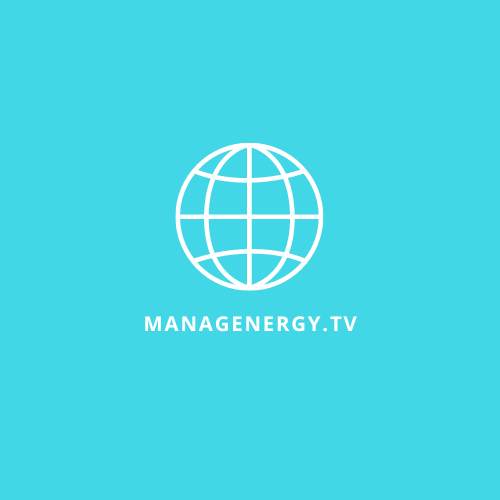
 Sustainable Supply Chain Management3 months ago
Sustainable Supply Chain Management3 months agoManagEnergy Acquires GPST2030.org Domain to Strengthen Commitment to Sustainable Transport
-
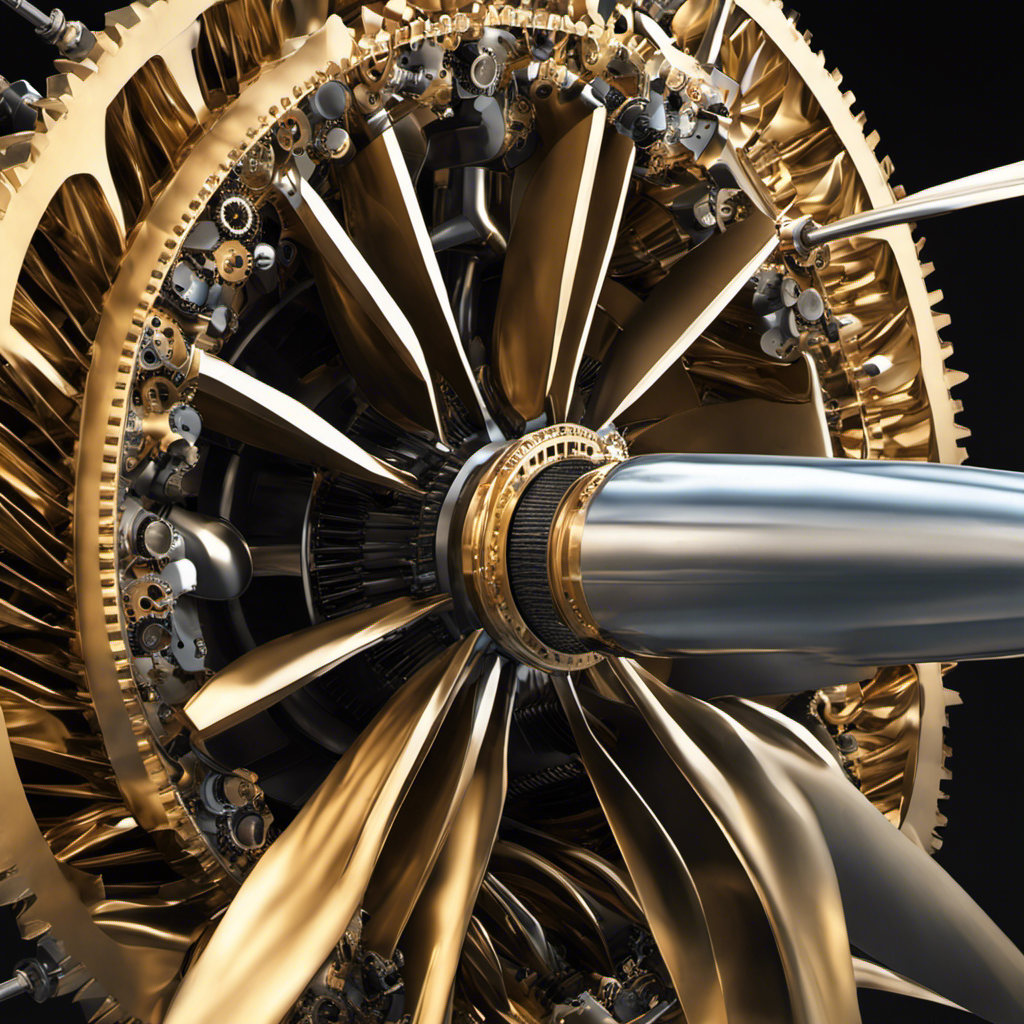
 Wind Energy3 months ago
Wind Energy3 months agoHow Much Oil Does It Take To Lubricate A Wind Turbine
-

 Electric Motorbike1 month ago
Electric Motorbike1 month agoCalifornia Electric Motorcycle Laws: A Comprehensive Guide to Riding Safely
-
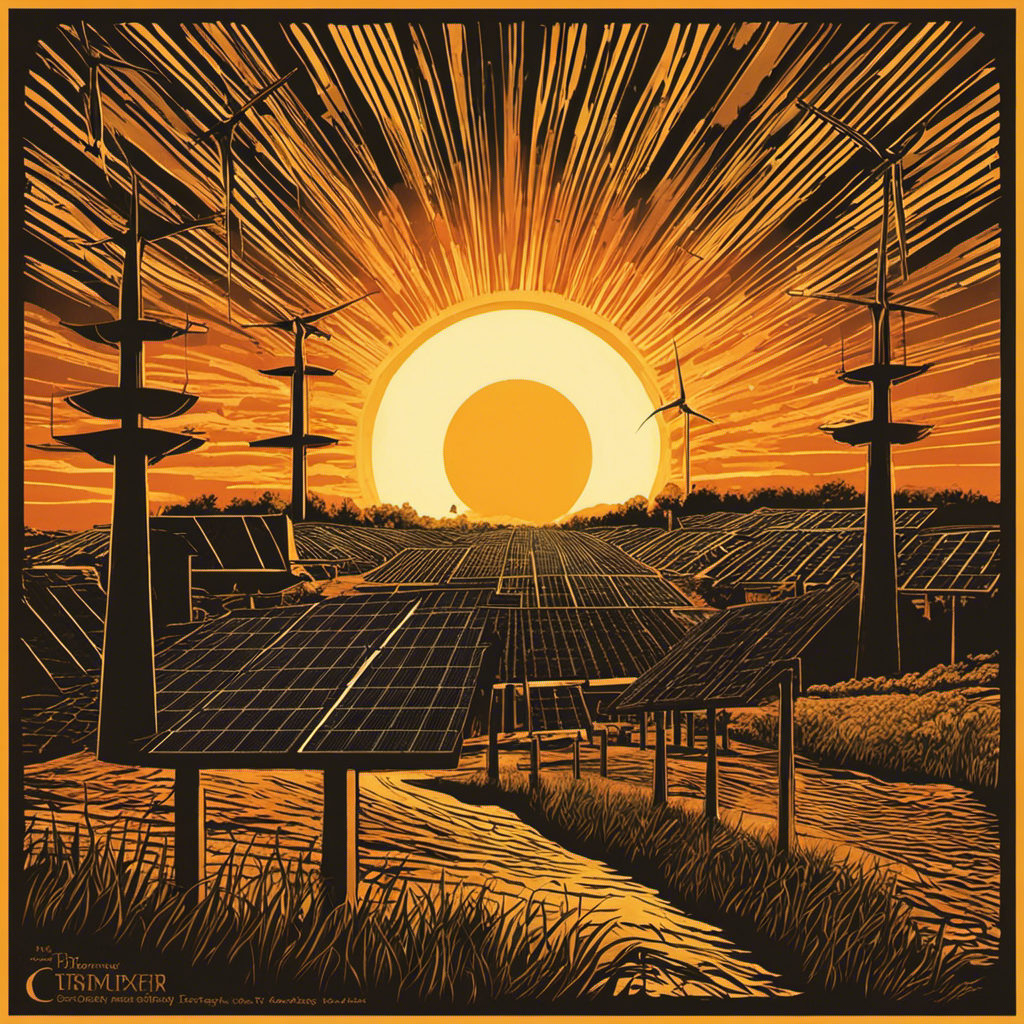
 Solar3 months ago
Solar3 months agoIn 2009, About What Percent Of U.S. Energy Consumption Was Supplied By Solar Energy
-

 Electricity Vehicle1 month ago
Electricity Vehicle1 month agoThe Future of Electric Vehicles: Trends and Innovations to Watch
-

 Wind Energy1 month ago
Wind Energy1 month agoRevolutionizing Highways: Wind Turbines Take the Road to Renewable Energy
-

 Wind Energy1 month ago
Wind Energy1 month agoEnvironmental Innovation Turned Deadly: Ocean Wind Turbines Pose Threat to Whales’ Survival
-
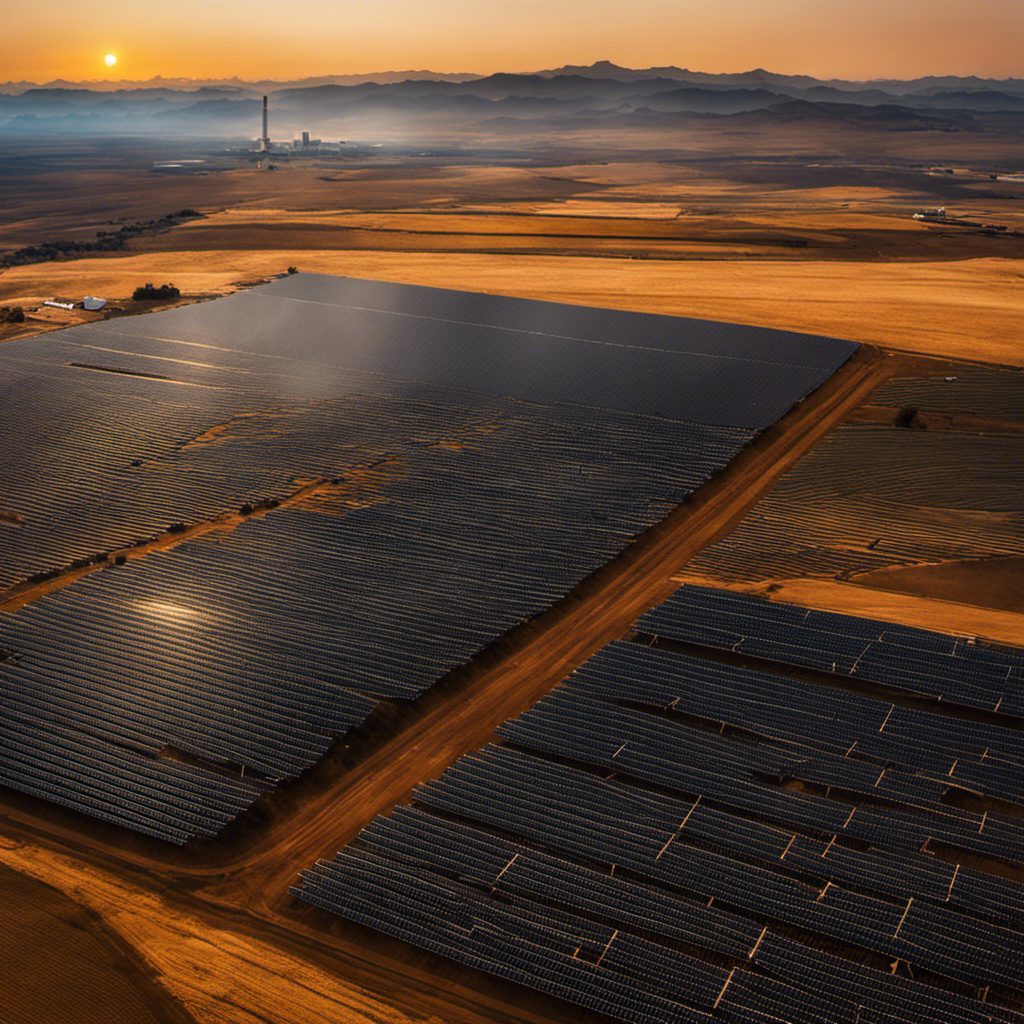
 Solar3 months ago
Solar3 months agoWhy Should We Use Solar Energy Instead Of Fossil Fuels
